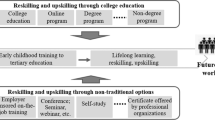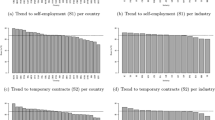Abstract
This paper considers an optimization problem for an enterprise (she) who employs a graduate (he) getting qualification from vocational schools by designing a compensation contract. The vocational school graduate’s reservation wage depends on his professional skills and the degree to which the skills are general. Moreover, the vocational graduate has asymmetric information about the professional skills which are unknown to the enterprise. In order to maximize the enterprise’s expected profit and elicit the vocational graduate’s true skills, a compensation contract optimization model is established based on principal-agent theory. The analysis mainly demonstrates that the optimal pay-performance sensitivity is positively related with the graduate’s professional skills and the degree to which professional skills are general in the setting of asymmetric information. Furthermore, when general skills are relatively large, the optimal pay-performance sensitivity plays a more important role than the fixed wage in the total compensation structure. In contrast, the enterprise only pays a fixed wage to the vocational graduate and the pay-performance sensitivity is zero in a benchmark setting of symmetric information. Finally, the sensitive analysis shows the effects of the related parameters on the optimal pay-performance sensitivity, respectively.


Similar content being viewed by others
References
Mirrlees J (1971) An exploration in the theory of optimum income taxation. Rev Econ Stud 38:175–208
Ross S (1973) The economic theory of agency: the principal’s problem. Am Econ Rev 63:134–139
Myerson RB (1982) Optimal coordination mechanisms in generalized principal-agent problems. J Math Econ 10(1):67–81
Wang L (2003) The analysis of employment principal-agent relationship in the inner labor market. Res Financ Econ Issues 4:25–30
Paola M, Soppa V (2007) Returns to skills, incentives to study and optimal educational standards. J Econ 92(3):229–262
Azariadis C (1983) Employment with asymmetric information. Q J Econ 98:157–172
Lim W (2001) Producer-supplier contracts with incomplete information. Manag Sci 47:709–715
Iyer A, Schwarz L (2005) A principal-agent model for product specification and production. Manag Sci 51:106–119
Laffont J (1987) Optimal taxation of a non-linear pricing monopolist. J Public Econ 33:137–155
Chen F (2005) Salesforce incentives, market information, and production/inventory planning. Manag Sci 51:60–75
Greenwald B (1986) Adverse selection in labour market. Rev Econ Stud 53:325–347
Wasmer E (2006) General versus specific skills in labor markets with search fictions and firing costs. Am Econ Rev 96(3):811–831
Galor O, Tsiddon D (1997) Technological progress, mobility, and economic growth. Am Econ Rev 87(3):363–382
Lazear EP (2009) Firm-specific human capital: a skill-weight approach. J Political Econ 117(5):914–940
Tang H (2012) Labor market institutions, firm-specific skills, and trade patterns. J Int Econ 87(2):337–351
Gould ED, Moav O, Weinberg BA (2001) Precautionary demand for education, inequality, and technological progress. J Econ Growth 6(4):285–315
Lamo A, Messina J, Wasmer E (2011) Are specific skills an obstacle to labor market adjustment? Labor Econ 18(2):240–256
Kruege D, Kumar KB (2004) Skill-specific rather than general education: a reason for US-Europe growth differences? J Econ Growth 9(2):167–207
Acemoglu D (1998) Why do new technologies complement skills? Directed technical change and wage inequality. Q J Econ 113(4):1055–1089
Dutta S (2008) Managerial expertise, private information, and pay-performance sensitivity. Manag Sci 54(3):429–442
Wang XZ, Dong C (2009) Improving generalization of fuzzy if-then rules by maximizing fuzzy entropy. IEEE Trans Fuzzy Syst 17(3):556–567
Wang XZ, Dong L, Yan J (2012) Maximum ambiguity based sample selection in fuzzy decision tree induction. IEEE Trans Knowl Data Eng 24(8):1491–1505
Wang XZ, Xing H, Li Y et al (2014) A study on relationship between generalization abilities and fuzziness of base classifiers in ensemble learning. IEEE Trans Fuzzy Syst. doi:10.1109/TFUZZ.2014.2371479
Acknowledgments
This work was supported by the Humanity and Social Science Foundation of Ministry of Education of China under Grant No. 12YJA880141.
Author information
Authors and Affiliations
Corresponding author
Rights and permissions
About this article
Cite this article
Liu, X., Xu, Y. Compensation contract design for vocational graduates with general and specific skills. Int. J. Mach. Learn. & Cyber. 6, 811–818 (2015). https://doi.org/10.1007/s13042-015-0415-9
Received:
Accepted:
Published:
Issue Date:
DOI: https://doi.org/10.1007/s13042-015-0415-9




